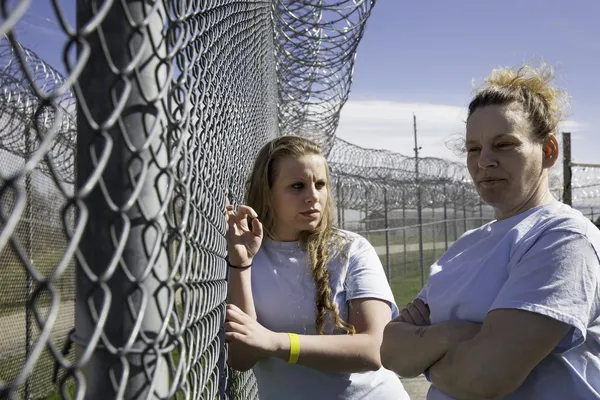Eye For Film >> Movies >> Jacinta (2020) Film Review
Jacinta
Reviewed by: Amber Wilkinson

Some documentaries are built on painstaking research and others are built on gaining trust and, more importantly, keeping that trust over time. Jessica Earnshaw's debut film is a fine example of the latter, as she follows the lives of Jacinta and her family over more than three years, exploring the bonds between daughters and mothers - for good and ill - as she goes.
At 26, Jacinta has already followed in her mum Rosemary's footsteps, going so far as to have been incarcerated at the same jail - Maine Correctional Centre - where Rosemary is also serving a sentence. Both have had lives blighted by drugs and Jacinta, who has spent most of her life in jail since she was 15, also has a daughter, Caylynn, who is 10 when the film begins. The youngster lives with the parents of her father - who is also in jail - and her story is also told here.

Earnshaw immerses us in the relationship between Jacinta and Rosemary at the start of the film, as we see Jacinta, a smile lighting up her face on home video, and then, from prison, talking about her mum in the sort of glowing terms that might prove surprising to some viewers. "She knows about addiction, she knows about incarceration, she knows about everything," she says. The danger of this to Jacinta's mental health is also evident in the way that Rosemary, when speaking about her daughter's imminent release while she still has time to serve, says, "I wish she could just stay here and wait for me".
Caylynn and Jacinta also have a strong bond, although it's clear from the off that Jacinta is keen to protect her daughter from the worst of her issues, also writing letters to her from jail that she never sends. On release, Earnshaw keeps the camera rolling, slowing probing at the ways in which Jacinta's life has shaped her emotionally and her tendency towards what the manager of the sobriety house she initially goes to terms "self-sabotage". Or, as Jacinta puts it as she thinks about falling off the wagon, "talking myself out of talking myself out of it".
Parts of this film are a tough watch - and there is footage of drugs being injected - but that is because Earnshaw doesn't shy away from the fundamentals of Jacinta's situation and her relationship with addiction - tellingly describing drugs as being "like the best friend who never talks back". Jacinta is smart and observant, one of the reasons the film is so compelling, as it's easy to see the person she might become if she could stay clean. Earnshaw also gives Caylynn plenty of room to express her emotions about the situation and shows the complexity of the relationship between her and her mum. The documentarian's patience and obvious care for her subject matter pays off, as she sticks with Jacinta, even at times when it must have been difficult for Earnshaw to maintain an emotional distance. In doing so, she offers a genuine insight into the cycle of addiction and its triggers.
Reviewed on: 28 Apr 2020















